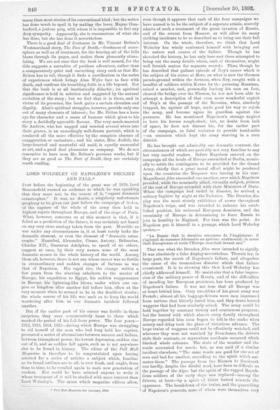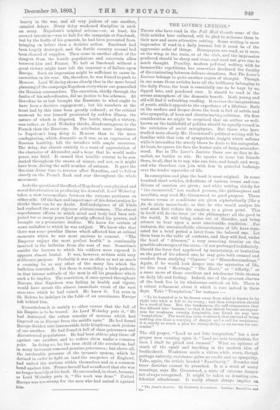LORD WOLSELEY ON NAPOLEON'S DECLINE AND FALL.* JUST before the
beginning of the great war of 1870, Lord Beaconsfield warned an audience to which be was speaking that they must not, in the course of it, " expect dramatic oata.stroplaes." It was, no doubt, a singularly unfortunate prophecy to be given out just before the campaign of Sedan, of the capture of the whole of the army then held in highest repute throughout Europe, and of the siege of Paris. What, however, concerns us at this moment is that, if it failed as a prediction of the future, it was certainly not based on any very close analogy taken from the past. Horrible as war under any circumstances is, it at least rarely lacks the dramatic element, or even the element of " dramatic catas- trophe." Hannibal, Alexander, Caasar, Antony, Belisarius, Charles XII., Gustavus Adolphus, to speak of no others, suggest at once, by their very names, some of the most dramatic scenes in the whole history of the world. Among them all, however, there is not one whose career was so fertile in extraordinary and sudden changes of fortune as was that of Napoleon. His rapid rise, the change within a few years from the starving subaltern to the master of Europe, his expedition to Egypt, his sudden reappearance in Europe, his lightning-like blows, under which one em- pire or kingdom after another fell before him, often at the -very moment when he seemed to be in the deadliest straits ; the whole course of his life was such as to keep the world wondering after him, as one dramatic incident followed -another.
But if the earlier part of his career was fertile in those surprises, they were comparatively tame to those which marked the period of his fall from power. The four years- 1812, 1813, 1814, 1815—during which Europe was struggling to rid herself of the man who had long held her captive, .presented a series of alternations between success and failure, between triumphant power, the lowest depression, sudden rise out of it, and as sudden fall again, such as is not anywhere ,else to be found in history. The editor of the Pall Mall .Magazine is therefore to be congratulated upon having selected for a series of articles a subject which, familiar as its broad outlines are to all, is ever fresh, and ought, from time to time, to be recalled again to each new generation of readers. Nor could he have selected anyone to write it whose treatment of it will be studied with more interest than Lord Wolseley's. The space which magazine editors allow, Pail Mall Magazine for January, 1894. even though it appears that each of the four campaigns we have named is to be the subject of a separate article, scarcely admits of such a treatment of the great invasion of Russia, and of the retreat from Moscow, as will allow its many striking incidents to be so described as to bring out their full interest. On the whole, therefore, we think that Lord Wolseley has wisely contented himself with bringing out the nature and causes of the failure. Though he has sketched the history, he has only here and there attempted to bring out the many details which, each of themselves, might well furnish matter for separate records. Thus, though he has described that gallant episode of Ney's career which is the subject of his statue at Metz, on what is now the German parade-ground within the fortress, when Ney, caught with a handful of soldiers within Kovno by the pursuing Russians, seized a musket, and, personally leading his men on foot, cleared the bridge over the Niemen, he has not been able to attempt a description of that even more wonderful exploit of Ney's at the passage of the Beresina, when, similarly trapped, he, against all hope, made good his way to rejoin the army, and become again its guardian against the pursuers. He has mentioned Napoleon's strange neglect to have his horses rough-shod; but, no doubt from lack of space, he does not discuss his, for the earlier part of the campaign, as fatal omission to provide hand-mills —an omission which kept the army starving in a corn district.
He has brought out admirably one dramatic contrast, the circumstances of which are probably not very familiar to any but very careful readers. Before Napoleon entered on the campaign all the beads of Europe assembled at Berlin, nomin- ally to settle the contingents to be provided for the Grand Army, chiefly that a great moral effect might be produced upon the countries the Emperor was leaving in his rear. Magnificent fifes succeeded one another, over which Napoleon presided, while the nominally allied, virtually subject, princes of the rest of Europe attended with their Ministers of State. When the campaign bad ended in disaster, he arrived a solitary fugitive by night at the Tuileries. The Dresden dis- play was the most stately exhibition of power throughout Napoleon's reign, and was intended to indicate his estab- lished position, his universal European dominion, and the unanimity of Europe in determining to force Russia to join in hostility to England. For that was the point. As Napoleon put it himself in a passage, which Lord Wolseley quotes,— "La Tinsels 6tait la dernilre ressource de l'Angleterre s'agissait de ramener Alexandre au systime continental ; la cause etait Europ5enne at toute l'Europe marehait devant moi."
That was what the Dresden fetes were intended to signify. It was absolutely a false display nevertheless. Therein lay, in large part, the secret of Napoleon's failure, and altogether the cause of the tremendous disaster which that failure occasioned. It is to showing this that Lord Wolseley has chiefly addressed himself. He maintains that a false impres- sion of the military power of Russia, and of the difficulties of invading her European provinces, has been produced by Napoleon's failure. It was not tree that all Europe was at heart behind him. Only two-fifths of his great army was French ; almost all his baggage-drivers were men impressed from nations that bitterly hated him, and they drove horsed waggons that had been similarly seized. The army could be held together by constant victory and continuous progress ; but the hatred with which almost every family throughout Europe regarded him soon began to tell in the ranks when misery and delay took the place of victorious advance. The huge trains of waggons could not be effectively watched, and wherever they were not watched by Frenchmen the drivers stole their contents, or mysterious accidents occurred which blocked whole columns. The state of the weather and the roads accounted for much; but, as was said of a similar incident elsewhere, "The same roads are good for one set of men and bad for another, according to the spirit which ani- mates them." The passage from the Niemen to Smolensk can hardly, despite the direful mud, have been as difficult as the passage of the Alps; but the spirit of the ragged Repub- lican soldiers of the early days was replaced—among the drivers, at least—by a spirit of bitter hatred towards the oppressor. The breakdown of the trains, and the quarrelling of Napoleon's generals, none of whom were themselves very
hearty in the war, and all very jealous of one another, entailed delays. Every delay weakened discipline in such an army. Napoleon's original scheme—or, at least, his avowed intention—was to halt for the campaign at Smolensk, but by the faults of his generals, he had been prevented from bringing on before then a decisive action. Smolensk had been largely destroyed, and the fertile country around had been cleared of supplies. Then came in another effect of the dangers from the hostile populations and uncertain allies between him and France. To halt at Smolensk without a great victory might have left the impression of failure upon Europe. Such an impression might be sufficient to cause in- aurrection in his rear. On, therefore, he was forced to push to Moscow. Lord Wolseley shows clearly that in the mere broad planning of the campaign Napoleon everywhere out-generalled the Russian commanders. The execution, chiefly through the faults of his subordinates, did no justice to his schemes. At Borodino be at last brought the Russians to what ought to have been a decisive engagement ; but his numbers at the front had by this time been greatly reduced ; at the critical moment he was himself prostrated by sudden illness, the nature of which is disputed. The battle, though a victory, was rather, as Lord Wolseley thinks, disadvantageous to the French than the Russians. He attributes more importance to Napoleon's long delay in Moscow than to the mere conflagration, which, dramatic as it was, as an expression of Russian hostility, left the invaders with ample resources. The delay, due almost entirely to a want of appreciation of tie character of Alexander, and a hope that he would make
peace, was fatal. It caused that terrible retreat to be con- ducted throughout the snows of winter, and not, as it might
have been, during the mild weather of autumn. It gave the Russian Army time to recover after Borodino, and to follow closely on the French flank and rear throughout the whole movement.
As to the question of the effect of Napoleon's own physical and moral deterioration in producing his downfall, Lord Wolseley takes a view intermediate between the extreme partisans on either side. Of the fact and importance of his deterioration he thinks there can be no doubt. Self-indulgence of all kinds had replaced the most rigorous abstemiousness. The almost superhuman efforts to which mind and body had been sub- jected for so many years bad greatly affected his powers, and brought on a premature decline. We know for certain of some maladies to which he was subject, We know also that there was some peculiar illness which affected him at critical moments which he was most anxious to conceal. " The Emperor enjoys the most perfect health" is continually inserted in the bulletins from .the seat of war. Sometimes amidst the horrors to which his soldiers were exposed it appears almost brutal. It was, however, written with very deliberate ixtrpose. Probably it was us often as not as much a cunning lie as any other of the many lies which the bulletins contained. Yet there is something a little pathetic in that intense solitude of the man in all his grandeur which i such a lie implies. The conviction, if once spread throughout Europe, that Napoleon was failing in health and vigour, would have meant the almost immediate crash of the vast structure which he had raised. He knew it. Yet even in St. Helena he indulges iu the fable of an unanimous Europe left behind him.
Nevertheless it is mainly to other causes that the fall of his Empire is to be traced. As Lord Wolseley puts it, "He had destroyed the rotten remains of systems which had lingered on in Europe from the middle ages." He had found Europe divided into innumerable little kingdoms, each jealous of one another. He bad found it full of class grievances and discontented populations. He bad been able to play these off against one another, and to reduce them under a common yoke. In doing so, he, the true child of the revolution, had in many instances removed genuine grievances ; but above all, the intolerable pressure of the tyrannic system, which he ' devised in order to fight on land the sea-power of England, had united the nations within themselves and in a common bond against him. France herself had so suffered that she was no longer heart ily at his back. He succumbed, in short, because, as Lord Wolseley puts it, "His work was done." United Europe was too strong for the man who had united it against
him.



































 Previous page
Previous page